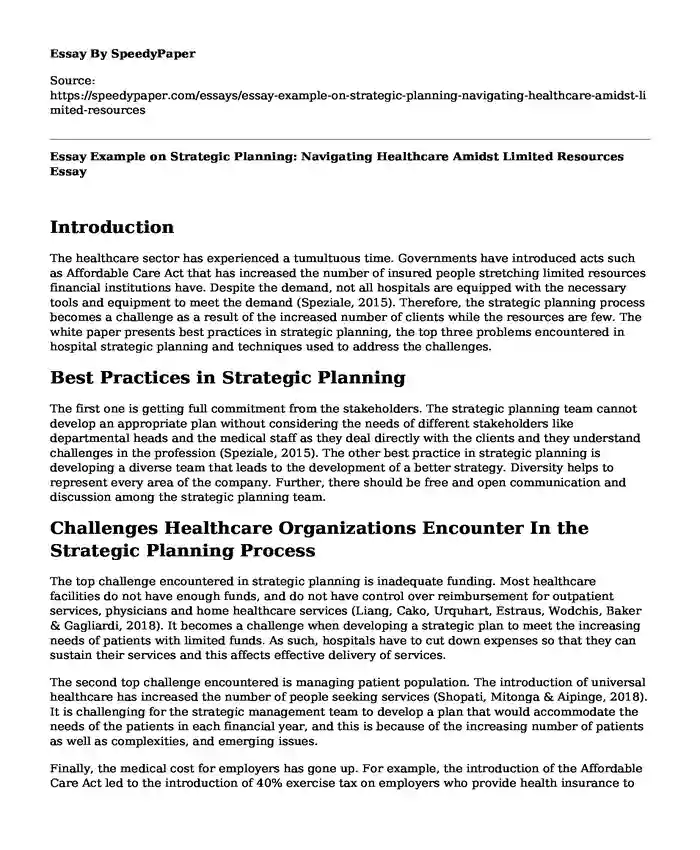
| Type of paper: | Essay |
| Categories: | Planning Healthcare Strategic management |
| Pages: | 3 |
| Wordcount: | 724 words |
Introduction
The healthcare sector has experienced a tumultuous time. Governments have introduced acts such as Affordable Care Act that has increased the number of insured people stretching limited resources financial institutions have. Despite the demand, not all hospitals are equipped with the necessary tools and equipment to meet the demand (Speziale, 2015). Therefore, the strategic planning process becomes a challenge as a result of the increased number of clients while the resources are few. The white paper presents best practices in strategic planning, the top three problems encountered in hospital strategic planning and techniques used to address the challenges.
Best Practices in Strategic Planning
The first one is getting full commitment from the stakeholders. The strategic planning team cannot develop an appropriate plan without considering the needs of different stakeholders like departmental heads and the medical staff as they deal directly with the clients and they understand challenges in the profession (Speziale, 2015). The other best practice in strategic planning is developing a diverse team that leads to the development of a better strategy. Diversity helps to represent every area of the company. Further, there should be free and open communication and discussion among the strategic planning team.
Challenges Healthcare Organizations Encounter In the Strategic Planning Process
The top challenge encountered in strategic planning is inadequate funding. Most healthcare facilities do not have enough funds, and do not have control over reimbursement for outpatient services, physicians and home healthcare services (Liang, Cako, Urquhart, Estraus, Wodchis, Baker & Gagliardi, 2018). It becomes a challenge when developing a strategic plan to meet the increasing needs of patients with limited funds. As such, hospitals have to cut down expenses so that they can sustain their services and this affects effective delivery of services.
The second top challenge encountered is managing patient population. The introduction of universal healthcare has increased the number of people seeking services (Shopati, Mitonga & Aipinge, 2018). It is challenging for the strategic management team to develop a plan that would accommodate the needs of the patients in each financial year, and this is because of the increasing number of patients as well as complexities, and emerging issues.
Finally, the medical cost for employers has gone up. For example, the introduction of the Affordable Care Act led to the introduction of 40% exercise tax on employers who provide health insurance to their employees. In response, employers have increased insurance health payments. In this regard, companies offer the best reimbursement while insurance gives the worst refunds (Liang et al. 2018). In this regard, there are differences in strategic planning for private-sponsored patients and the healthcare the government provides. It is challenging to plan for healthcare services when the premiums differ.
Addressing the Challenges
Healthcare facilities can manage patient population by offering education and free screenings so that they can prevent potential conditions like heart diseases and obesity. The technique would reduce the number of people seeking medical services as a result of lifestyle diseases. Secondly, the government should consider transiting health insurance from private entities towards government-provided healthcare (Liang et al. 2018). Consequently, there will be standard premiums and rates paid thus improving the strategic planning process. Regarding inadequate funding, the strategic management team would address the problem by introducing alternative sources of revenue. The organization's management team should consider developing alternative ways of raising income so that it can generate revenue to expand the facility to accommodate the demand for the services.
Conclusion
The healthcare sector has experienced tremendous disruptions due to the changes experienced in recent years. Best practices to consider in the strategic planning process include a commitment from the stakeholders, open communication and engaging the stakeholders. The top challenges include inadequate funding, differences in government premiums and private companies and increasing population. The techniques to address the problems include developing universal premiums, providing education to prevent rising cases of lifestyle diseases and identifying alternative sources of finance to execute its development activities.
References
Liang, L. Cako, A. Urquhart, R. Estraus, S. Wodchis, W. Baker, R & Gagliardi, A. (2018). Patient engagement in hospital health service panning and improvement: A scoping review. BMJ open 8(1), 1-8.
Shopati, A. Mitonga, K & Aipinge, L. (2018). Factors affecting strategic plan execution process in public healthcare. International Journal of Community Medicine and Public Health 5(2), 474-481.
Speziale, G. (2015). Strategic management of a healthcare organization: engagement, behavioural indicators, and clinical performance, European Heart Journal Supplements, 17 (2015), A3-A7.
Cite this page
Essay Example on Strategic Planning: Navigating Healthcare Amidst Limited Resources. (2022, Dec 26). Retrieved from https://speedypaper.com/essays/essay-example-on-strategic-planning-navigating-healthcare-amidst-limited-resources
Request Removal
If you are the original author of this essay and no longer wish to have it published on the SpeedyPaper website, please click below to request its removal:
- Technology and Fashion Essay Example
- Smartphones and Our Abilities to Solve Problems - Essay Example
- Management Essay Sample: The Importance of Organization
- Free Essay Example: Journey to Sustainability
- Free Essay: How Useful Is the Theory of Disruptive Innovation?
- Essay Example. Another Strategy for Addressing the Evaluation Challenge Identified by My Colleague
- The Wage Disparity - Free Essay Example
Popular categories




